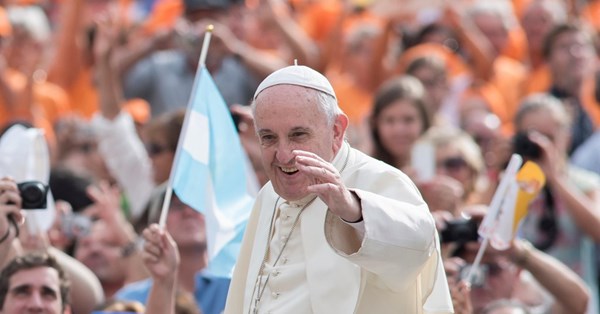Jonathan Luxmoore writes:
POPE FRANCIS, who died on Easter Monday, aged 88, after 12 years in office, and after greeting the crowds in St Peter’s Square on Easter Day, will be remembered for nurturing a more sympathetic and pastoral application of Roman Catholic teaching in response to real-life complexities and dilemmas.
He believed deeply in the power of prayer to transform hearts and minds, and in the capacity of dialogue to settle conflicts. While his evangelical vision of a Church purged of top-down clericalism was advanced by his historic “Synod on Synodality”, the biggest public consultation in history, he did not live to see his reformist ideas fully embraced and implemented.
Born Jorge Mario Bergoglio, at Flores, in Argentina, on 17 December 1936, the eldest of five in a family that had fled Benito Mussolini’s Italy, he attended a Roman Catholic school and technical college near Buenos Aires, working initially as a chemical technician and club bouncer.
He joined the Jesuit order in 1958, a year after having part of a lung removed during a severe pneumonia infection, and went on to teach literature and psychology at Catholic colleges in Santa Fe and Buenos Aires.
Ordained in 1969, Bergoglio served as novice master and later Jesuit provincial superior, before becoming Rector of the Philosophy and Theology Faculty of San Miguel in 1980, after brief study visits to Ireland and Germany.
After a stint as an auxiliary bishop, he was appointed Archbishop of Buenos Aires in 1998 and made a cardinal in 2001. Despite often tense relations with Presidents Carlos Menem and Nestor Kirchner, he championed peaceful coexistence in Argentina’s often confrontational politics, apologising on his Church’s behalf, while Bishops’ Conference president in 2005-11, for failing to protect people targeted during the military regime’s infamous “Dirty War” in the 1970s.
Having already been a candidate for the papal office at a previous conclave in 2005, Bergoglio was elected Pope on 13 March 2013 after the abdication of Benedict XVI, becoming the first Jesuit Pontiff and the first from outside Europe since the eighth century.
Francis’s reformist agenda became apparent from the outset by his abolition of Vatican staff bonuses traditionally paid at the start of a new pontificate, and by his appointment of an international committee of cardinals to advise him.
Also apparent was his instinct to reach out to previously marginalised groups, signalled by his much quoted retort, “Who am I to judge?” when asked about LGBT rights in a July 2013 TV interview.
The new style was evident in his first encyclical, Lumen Fidei, as well as in his first apostolic exhortation, Evangelii Gaudium, the following November, which invited Roman Catholics to be “bold and creative” in rethinking evangelisation, while shunning “a narcissistic and authoritarian elitism” based on “inspecting and verifying”.
While upholding traditional church teaching on male-female marriage and opposing gender ideology, Francis would go on to support same-sex civil unions and deplore the criminalisation of homosexuality, urging his bishops to “distinguish between a sin and a crime”.
His search for a more positive understanding of love and sexuality in the Church was made clear in a second exhortation, Amoris Laetitia, issued in April 2016 after a Synod of Bishops on the family and evangelisation.
This warned that not all doctrinal and moral issues could be “settled by interventions of the magisterium” and called on its first page for “each country or region” to find solutions “suited to its culture and sensitive to its traditions”.
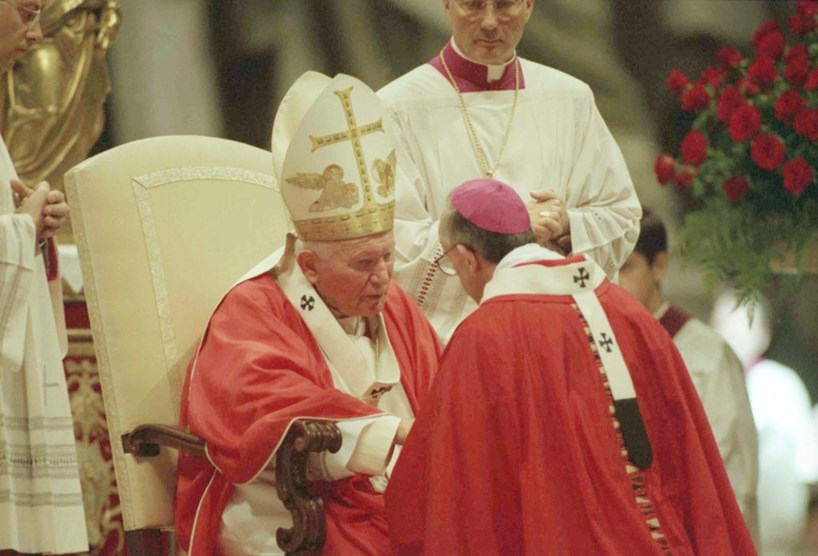 AlamyPope John Paul II greets the Archbishop of Buenos Aires, Cardinal Jorge Mario Bergoglio, in June 1998
AlamyPope John Paul II greets the Archbishop of Buenos Aires, Cardinal Jorge Mario Bergoglio, in June 1998
Different communities would have to devise “more practical and effective initiatives”, Amoris Laetitia noted, through “continued open discussion” and “honest, realistic and creative” thinking, which avoided both an “immoderate desire for total change” and a tendency to “solve everything by applying general rules”.
The tone of the 325-point exhortation, which also urged the avoidance of a “cold bureaucratic morality”, was widely contested. Four conservative cardinals — Raymond Burke, Joachim Meisner, Walter Brandmüller, and Carlo Caffarra — complained of “uncertainty, confusion, and disorientation”, and demanded clarification in the first of many dubia, or formal doubts, concerning the Pope’s views on divorce and marriage after divorce.
As battle lines were drawn between reformists and traditionalists, in February 2017, posters appeared on Rome billboards accusing Francis of “lacking mercy”, while a fake edition of the Vatican’s L’Osservatore Romano was emailed to Curia officials, giving an equivocal mock-papal answer to the four cardinals.
Controversy over the Pope’s pastoral reforms would continue, pitting conservative Bishops’ Conferences against their more liberal neighbours, while global lobbies such as the Catholic Women’s Council and We Are Church accused him of not going far enough.
In March 2021, when the Dicastery for Doctrine of the Faith (DDF) reiterated a ban on the blessing of same-sex unions, the ruling was welcomed by conservative RC groups in Africa, Latin America, and Asia. It was openly rejected, however, by hundreds of priests and theologians in Germany, where the Church had launched its own “Synodal Way” reform process in 2019 to reassess church teaching on authority, sexual morality, priestly celibacy, and the part played by women.
Conflict intensified in December 2023, when the DDF, now headed by Cardinal Víctor Manuel Fernández, a fellow Argentinian, released a pre-Christmas declaration, Fiducia Supplicans, effectively reversing its 2021 ruling and conditionally allowing priests for the first time to bless same-sex couples “outside of a liturgical framework”, although without “officially validating the status of same-sex unions” or “changing in any way the Church’s perennial teaching on marriage”.
Fiducia Supplicans was defended by many Western bishops and justified by Francis as expressing the Church’s closeness to people “in different situations”. It was rejected, however, by some Bishops’ Conferences and dioceses, mostly in the global South. These were still refusing to approve blessings at his death.
After a series of scandals over the previous decade, Francis took a strong stand against sexual abuse, issuing a motu proprio, Vos Estis Lux Mundi, in May 2019, which required accusations to be reported directly to Rome.
During the same year, he unfrocked a former Archbishop of Washington, Theodore McCarrick, who had rebuffed reports of sexual misconduct dating back to the 1980s. Later, Pope Francis authorised publication of a long Vatican report that implicitly criticised inaction by St John Paul II and Benedict VI. Francis strengthened cooperation with civil-law enforcement and ensured that Bishops’ Conferences and religious orders worldwide adopted appropriate guidelines for action. He issued numerous apologies and thanked the media in November 2021 for the “voice given to abuse victims”.
During the coronavirus pandemic, Francis opposed the closure of churches in Rome, delivering a televised blessing to the world, in a deserted St Peter’s Square, which was watched by millions in March 2020.
Like other church leaders, he viewed vaccination as a moral obligation and endorsed calls for a post-pandemic “Build back better” strategy, which would include a universal basic wage and higher taxes on the super-rich.
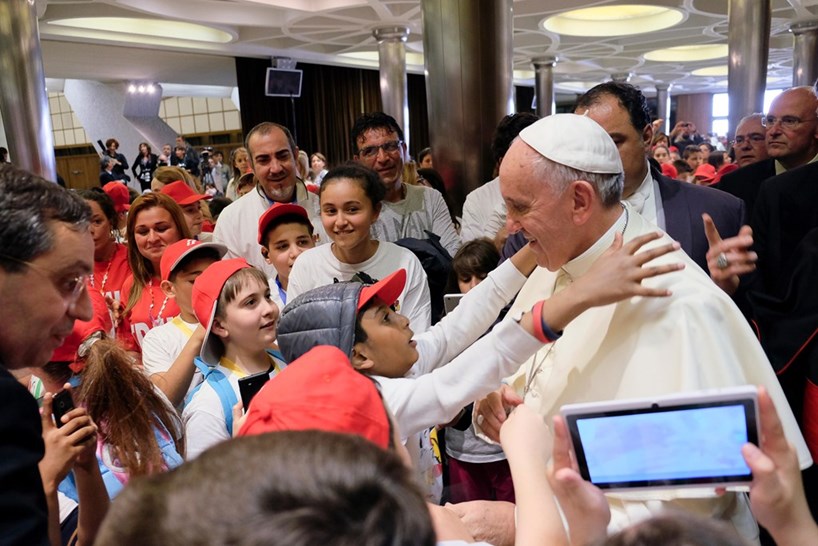 AlamyPope Francis meets children from Naples who took part in the annual “Children’s Train
AlamyPope Francis meets children from Naples who took part in the annual “Children’s Train
Meanwhile, he extended his predecessors’ condemnation of abusive capitalism, consumerism, and over-development, instituting an annual World Day of the Poor in November 2016. He also committed the Church to seeking the worldwide abolition of capital punishment, revising the monumental 1992 Catechism of the Catholic Church to define it as “an attack on the inviolability and dignity of the person”.
Francis highlighted the plight of refugees and asylum-seekers, meeting illegal migrants on the Italian transit island of Lampedusa in July 2013, and on Lesbos in April 2016, and repeatedly deploring how the Mediterranean Sea had become a cemetery for thousands attempting dangerous crossings from North Africa.
Under his leadership, the RC Church also emerged as a significant force for environmental protection, encouraged by a May 2015 encyclical, Laudato ‘Si, which impelled movements and organisations worldwide.
The 40,000-word document, taking its title from St Francis of Assisi’s 13th-century “Canticle of the Sun”, analysed the human roots of the ecological crisis and damage inflicted on the “common home”, and urged “swift and unified global action”.
Among other initiatives, it inspired a new Vatican Dicastery for Promoting Integral Human Development, which made resources available to campaigning groups under a Laudato Si’ Action Platform.
Francis pressed home the ecological message in many later pronouncements, urging the United States not to withdraw from the 2016 Paris Agreement on climate mitigation, and coming close to attending the United Nations Climate Change Conference, COP 28, in Dubai, in late 2023.
In a new apostolic exhortation, Laudate Deum, that October, he warned that the world could be “near breaking point”, and criticised those who continued to deny or question the reality of global warming: the “silent disease affecting everyone”.
The “technocratic paradigm” underlying environmental decay was still “monstrously feeding upon itself”, Francis wrote. While many still believed in “a human being with no limits, whose abilities and possibilities can be infinitely expanded”, the “ethical decadence of real power” was being disguised by “marketing and false information”.
Like previous pontiffs, Francis also took steps to bolster interfaith and ecumenical relations.
In October 2020, his third encyclical, Fratelli Tutti, on fraternity and social friendship, also inspired by St Francis, reaffirmed a link between religious faith and human dignity, and called on Christians everywhere to back policies that would promote justice and the common good.
After decades of steady integration, the world, he warned, was showing “signs of a certain regression”, as long-buried conflicts resurfaced, alongside “instances of a myopic, extremist, resentful and aggressive nationalism”.
The encyclical reiterated the “universal destination of goods”, a key tenet of modern Catholic social teaching, noting that the rights to private property, free enterprise, and market freedom could not “supersede the rights of peoples and the dignity of the poor”.
It drew on an interfaith Document on Human Fraternity, signed with the Grand Imam of the Al-Azhar Mosque in Cairo, Sheikh Ahmed el-Tayeb, during the Pope’s 2019 visit to Abu Dhabi. It was co-presented in Rome by a Muslim judge, Mohamed Abdel Salam.
Francis had endorsed the use of force to protect Iraq’s religious minorities against Islamic State militants and demanded international protection of the region’s Yazidi refugees.
Visiting Iraq in March 2021, during one of several potentially dangerous journeys, he joined Muslim leaders in calling on all religious communities to work together for peaceful coexistence, and went on to sign another interfaith declaration in September 2024, after an inter-religious summit in Indonesia.
Besides several meetings with Archbishop Welby, who accompanied him on visits to South Sudan and the Democratic Republic of Congo in February 2023, Francis continued to support the long-running Anglican-Roman Catholic International Commission (ARCIC), despite growing divergences, and hosted Anglican Primates during a Rome meeting in May 2024.
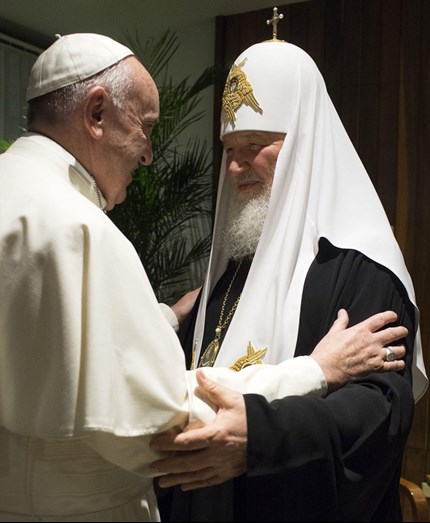 AlamyPope Francis greets Patriarch Kirill in Cuba, in February 2016. It was the first meeting between a Pope and a Russian Orthodox patriarch
AlamyPope Francis greets Patriarch Kirill in Cuba, in February 2016. It was the first meeting between a Pope and a Russian Orthodox patriarch
While remaining traditionally close to the Orthodox Ecumenical Patriarch, Bartholomew, he also sought improved relations with other Orthodox Churches, visiting Greece and Cyprus in December 2021, and meeting Patriarch Kirill of Moscow in Havana in February 2016.
Their 30-point Havana Declaration reaffirmed traditional Christian values on issues from cohabitation to euthanasia, and reaffirmed the goal of Christian unity. While praising communist-ruled Cuba as a “symbol of the hopes” for a “New World”, the document proved controversial for failing to mention human rights and democracy and passing over Russia’s bombing campaign in Syria and the occupation of eastern Ukraine.
Francis became the fourth pope to visit the UN in New York, addressing the General Assembly in September 2015, and warning, in a message to the Security Council in June 2023, of a “third world war fought piecemeal”.
In a speech to the European Parliament in November 2014, he urged the continent of Europe to preserve democracy and “rediscover the best of itself”, but also caused controversy by comparing it to “a grandmother, no longer fertile and vibrant”, a place where inspiring “great ideas” had been “replaced by bureaucratic technicalities”.
Controversy underlay many of the Argentinian pontiff’s international engagements, steered by his Secretary of State, Cardinal Pietro Parolin, and his Liverpool-born Secretary for Relations with States, Archbishop Paul Gallagher.
While repeatedly deploring Ukrainian sufferings after Russia’s full-scale invasion in February 2022, Francis took steps to mediate prisoner exchanges, urging Patriarch Kirill, in a notable online exchange that June, not to become an “altar boy” for Vladimir Putin. He frustrated Ukraine and its allies, however, by declining to criticise Russia directly and appearing to condemn Western arms supplies.
In May 2022, he told the Italian daily Corriere della Sera that NATO had contributed to the war by “barking at Russia’s door”. And, in August 2023, he called on Russian Catholics to uphold the legacy of their country’s “great, enlightened empire”, provoking protests again in March 2024 by calling on Ukrainians in a media interview to “have the courage of the white flag”.
Francis visited Israel and the Palestinian territories in May 2014, inviting Presidents Shimon Peres and Mahmoud Abbas to a Vatican prayer summit and signing a comprehensive agreement with the state of Palestine in June 2015, two years after its recognition by the Holy See.
He condemned Hamas’s October 2023 attack on Israel, as well as Israel’s subsequent war in Gaza, urging an immediate ceasefire, the release of hostages, and a two-state solution.
Although the Holy See is one of just a dozen states worldwide still recognising Taiwan, Francis approved an agreement with China in September 2018, allowing its communist regime a say in the nomination of Catholic bishops in return for recognising the Pope as leader of the Church.
The agreement, still unpublished, has been widely criticised for enabling tighter state control over China’s ten million-strong Catholic Church, with few if any reciprocal concessions to local Catholics — a charge also levelled against the Vatican’s conciliatory approach to Belarus and other authoritarian regimes.
Deploring populist political methods, Francis was critical of President Donald Trump, portraying the 2024 election campaign as a choice between two evils, and rebuking the new administration in 2025 over its mass migrant deportations.
Although still declining in Europe, the RC Church grew globally during his pontificate, reaching 1.389 billion members, 17.7 per cent of the world’s population, by 2025, according to the Vatican Annuario Pontificio.
With 5353 bishops and 407,730 priests, it remains the world’s foremost education and healthcare provider, operating 1358 universities, 227,000 schools and kindergartens, and 102,000 hospitals, clinics, and counselling centres.
The Vatican enjoys full diplomatic relations with all but a dozen of the world’s 193 countries and participates in 40 international organisations, including the United Nations and its agencies. In June 2024, Francis became the first Pope to address a summit of G7 industrialised countries, devoting his speech to the opportunities and dangers of artificial intelligence, now a significant Vatican concern.
While seeking to streamline bureaucracy in the Curia, Francis attempted to improve efficiency and transparency, opening its posts to non-clerical appointees.
Although female ordination continued to be ruled out, women made up one quarter of all Vatican staffers by early 2025, and an Italian Franciscan, Sister Raffaella Petrini, was appointed to serve as Governor of Vatican City State.
Besides authorising 1541 beatifications, Francis canonised 942 saints, including the English John Henry Newman, Mother Teresa of Calcutta, and his own predecessors John XXIII, Paul VI, and John Paul II.
He reformed numerous church procedures, from marriage annulments to recognition of miracles, and drew vast crowds for large events such as the Church’s World Youth Day festival, the last attended in Portugal in August 2023 by two million young people from 184 countries.
Francis provoked bitter conservative reactions in July 2021, when his apostolic letter Traditionis Custodes reversed the hands-off policy of Benedict XVI and imposed new restrictions on use of the traditional Latin mass in RC parishes.
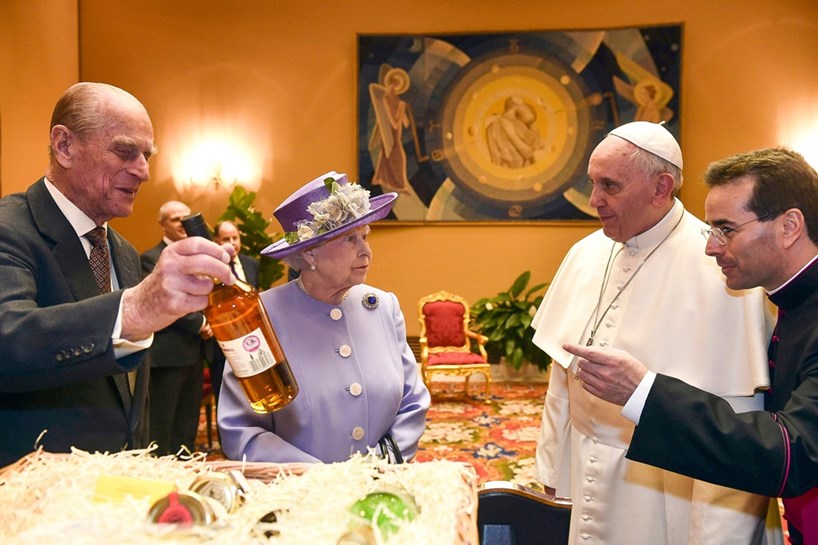 AlamyPope Francis meets Queen Elizabeth II and the Duke of Edinburgh, in private at the Vatican, April 2014
AlamyPope Francis meets Queen Elizabeth II and the Duke of Edinburgh, in private at the Vatican, April 2014
In April 2024, however, fears of fresh liberal pressure were partially allayed by a new declaration by Cardinal Fernandez’s Dicastery for the Doctrine of the Faith, Dignitas Infinita, reaffirming the Church’s condemnation of abortion, euthanasia, and assisted dying, and adding new new phenomena such as surrogacy, sex change, “digital violence”, and “cyber-bullying” to the list.
The complex themes of Francis’s pontificate were brought together at the 16th General Assembly of the Synod of Bishops, which was preceded by diocesan, national, and continental discussions across the worldwide Church. The formal “Synod on Synodality” occupied two month-long Rome sessions in 2023 and 2024, and was the first to include lay people among its 370 delegates, who discussed more than 80 reform proposals.
Its concluding report recommended greater lay involvement in decision-making and more leadership positions for women, as well as closer ecumenical cooperation, inclusive language, and a “culture of transparency, accountability and evaluation”.
Approved by Francis as part of his papal magisterium, it also called for a “salutary decentralisation” and further work on the “doctrinal and disciplinary competence” of Bishops’ Conferences in identifying “appropriate expressions” of the faith in local contexts.
The future practice of synodality would provide “a path of spiritual renewal and structural reform to make the Church more participatory and missionary”, the document said.
Implementation of the synodal process has continued into 2025, with ten working groups deliberating on topics such as “mission in a digital environment” and “shared discernment of controversial issues”, as Catholic communities worldwide debate how, in the report’s words, to nurture “a Church of Churches”.
In his fourth and final encyclical, Dilexit Nos, issued in the Synod’s final stages, Francis called for a rediscovery of love and compassion in today’s “heartless” world, taking the heart of Christ as guide and inspiration.
“We find ourselves before a powerful wave of secularisation that seeks to build a world free of God”, wrote the Pontiff, now wheelchair-bound.
“The love of Christ has no place in this perverse mechanism, yet only that love can set us free from a mad pursuit that no longer has room for gratuitous love. . . The Church also needs that love, lest it be replaced with outdated structures and concerns, excessive attachment to our own ideas and opinions.”
Francis died as his Church celebrated a Jubilee Year, which is expected to attract up to 60 million visitors to Rome for special festivals devoted to media and healthcare workers, volunteers, migrants, sportspeople, youth, and people with disabilities.
His modest and informal lifestyle, well known from his life in Argentina, was a feature of his pontificate, during which he lived at the Vatican’s Domus Sanctae Marthae guest house rather than in its Apostolic Palace, and operated an Instagram account with ten million followers, but reportedly never owned a laptop or mobile phone.
Francis created 110 cardinals from 72 countries, focusing where possible on the Church’s “peripheries”. At least 130 will be eligible to attend the conclave that chooses his successor.

